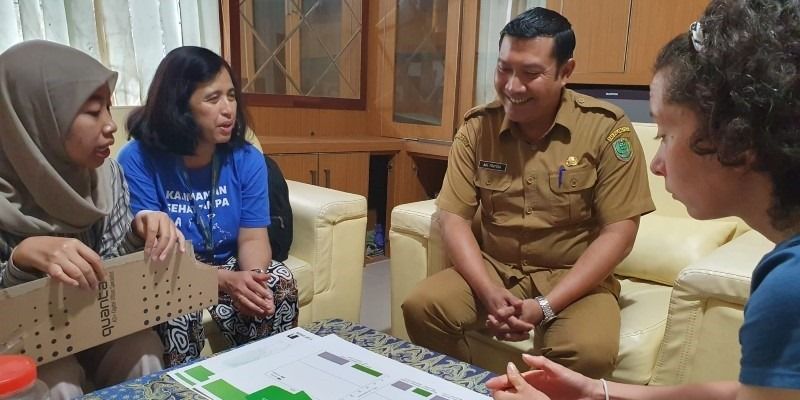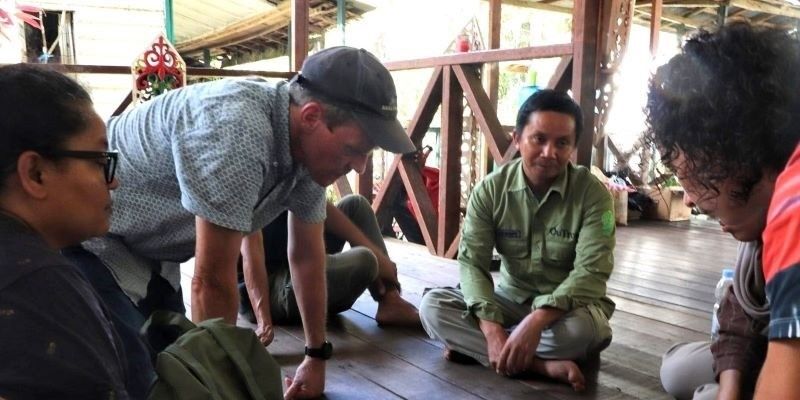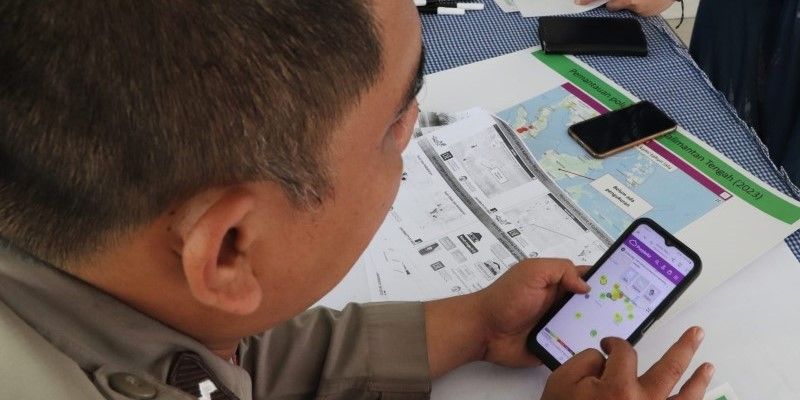
Researchers in the UK and Indonesia are working together to help communities fight the health and environmental impact of peatland fires.
The University of Leeds, the University of Exeter and other UK institutions have been collaborating on the KaLi project to track causes and impacts of fires for those living in Central Kalimantan in Borneo.
Peatland fires are a regular occurrence, causing widespread air pollution and carbon emissions. As well as their effect on people living in the area, they destroy huge areas of forest which are home to, amongst other species, the critically endangered Bornean orangutan.
The project aimed to support the creation of sustainable development and economic opportunities for communities in Central Kalimantan.
Setting up an overseas research project and establishing relationships with communities is a challenge which was enhanced by “invaluable” collaboration with international partners, including the University of Indonesia and the University of Palangka Raya (UPR).
Collaboration
Dr Ailish Graham, a Research Fellow in the School of Earth and Environment at the University of Leeds, said: “It wouldn’t have been possible to do the work without having international partner universities. This is a great example of universities working together.
“I found that I was really keen to keep working with the university as they had skills I didn’t have, which made the research so much better.
“They also have a lot of experience of research in the area, and many of the staff spoke the local language, which was a really big part of the project.”
The project involved placing air quality sensors in homes, schools, offices, hotels, restaurants and universities, to measure how much particle pollution is in the air. Dr Graham was helped by Hanun Nurrahmawati from the University of Indonesia, who contacted villages and recruited volunteers.
“Colleagues from the Indonesian universities were able to help educate us about cultural differences – for example, how we might hold a meeting. For most meetings we would sit on a floor in a circle – it’s informal compared to what we might be used to, but it helped the community to relax and feel able to be open and contribute. They became part of our team, helping us collect data.” added Dr Graham.
“We were also going into people’s houses, and it was really important that we were respectful to their cultural norms.”

Researchers were also supported by the Borneo Nature Foundation (BNF), a wildlife and biodiversity conservation and research organisation. The BNF helped researchers to focus on which villages to target for their research, and to contact village heads in communities.
Dr Rory Padfield, an Associate Professor in Sustainability and Business at the University of Leeds, said: “The BNF have been invaluable – they have been our go-to at times of facilitating access to groups. They’re interested in sustainability in this area, and they have an ear to the ground.”
But the collaboration wasn’t just with institutions, he explained.
“Collaboration with other partners is so important – not just with other universities, but also with the communities affected. It’s so important we collect and document their experiences but also engage them in the research design,” he said.
KaLi opened my eyes to how big the world really is—there’s always more to discover, both locally and globally.
Researchers held focus groups with community members – such as village heads, women’s groups, young people and farmers - and policy makers to relay findings and hear about their personal experiences. Again, Indonesian universities and BNF were pivotal in setting up these meetings.
The University of Indonesia also helped set up meetings with organisations such as the Disaster Agency, which is responsible for categorising fire with ‘disaster status’ and triggering national funding being released to aid fire-fighting efforts and provide PPE to people in the region. Researchers also met with the Department for Education and the local Mayor.
In these meetings, discussions focused on local schools, which have no windows - so when there is a fire, smoke freely flows into classrooms and affects children.
Dr Graham said: “We hope that the monitors may help to reach ‘disaster status’ quicker, which would release funding. We also hope that monitors will emphasise the need to follow building regulations and that schools can be built with windows to provide protection when fires happen.”

Hanun Nurrahmawati, Research Assistant at the University of Indonesia, said: “Working with KaLi reminded me how good it feels to learn something new every day. It opened my eyes to how big the world really is—there’s always more to discover, both locally and globally. I genuinely improved my English and communication skills through this journey, and honestly, I’d love to see a KaLi 2.0 in the future.”
Though the researchers built positive relationships with many local communities, some weren’t as collaborative as others: “One of our sensors which had been fitted to a tree in a forest was actually pulled off – by an orangutan,” said Dr Graham.
Further information
The KaLi Project is led by the University of Exeter and includes contributions from the University of Leeds, University of Leicester, University of Indonesia, University of Palangka Raya (UPR), Gadjah Mada University (UGM), University of East Anglia (UEA), Kyoto University, London School of Economics (LSE) and Dresden University of Technology.
The partnership’s aim was to build an understanding of the complex issues surrounding drought and peat fires in Indonesian Borneo. In dry years, peatland fires burn for months with huge impacts locally, regionally and globally.
However, drought alone does not cause fire. Wildfires are invariably ignited by people to clear land for agriculture, and for other reasons, and then burn out of control on peatland that has been drained to grow crops. For more information on the project background, visit the KaLi Project website.
More information about the Borneo Nature Foundation’s work, including their efforts to protect threatened tree species, can be found on the Borneo Nature Foundation website.
For further information, please contact Becky Pascoe on r.pascoe@leeds.ac.uk